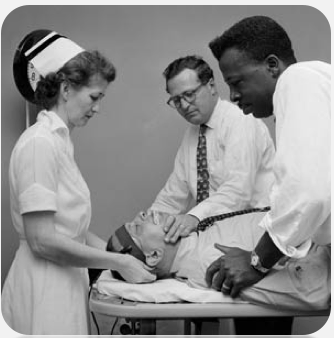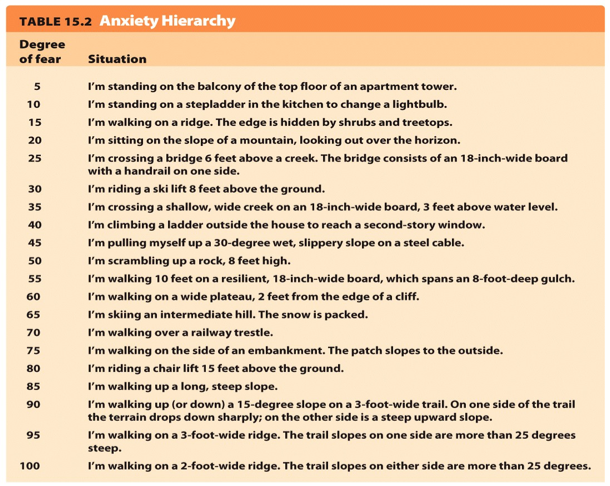Week 10 - Day 3 (Ch 12 pt 2) - Treatments
Navigate using audio
Quizlet on this and last lecture’s terms
Audio 0:00:00
Labotomies
-
PBS documentary
-

-
You can lose all of your personality
-
The other alternative therapies are rooted in this procedure
Therapy Techniques in Practice
-
Treatment of Anxiety Disorders
-
Treatment of Depression
-
Treatment of Bipolar
-
Treatment of Schizophrenia
Treatment of Anxiety Disorders
-
Treatments that focus on behavior and cognition are superior
-
Phobias
-
Audio 0:05:50
-
Systematic desensitization
-
Graduated exposure
-

Treatment of Anxiety Disorders
-
Treatments that focus on behavior and cognition are superior
-
Panic disorder: best treated with cognitive-behavioral therapy
-
Obsessive compulsive disorder: best treated with cognitive-behavioral therapy or exposure with response prevention
-
Audio 0:08:15
-
Treated with exposure sometimes
-
If someone has a fear of germs, you might have them shake a bunch of people's hands without allowing them to clean their hands to show them they won't explode
-

Treatment of Depression
-
Treatment options
-
Pharmacological (MAOIs, SSRIs, atypical)
-
Cognitive-behavioral therapy
-
Alternative therapies (ECT, TMS, DBS)
-
The placebo effect needs to be considered in judging effectiveness of medication
Audio 0:11:27
Gender Issues in Treating Depression
-
Women are twice as likely to be diagnosed with depression as men
-
The APA published Guidelines for Psychological Practice with Girls and Women (2007) to build awareness of gender-specific stressors
-
Men are reluctant to admit to depression and to seek appropriate therapy
-
This has been described as “a conspiracy of silence that has long surrounded depression in men” (Brody, 1997)
-
One goal is to help men stop masking their depression with alcohol, isolation, and irritability
Treatment of Bipolar Disorder
-
Lithium is more effective treatment, although we don’t really know why
-
Lithium is an “anti-manic” drug
-
Bipolar disorder is often treated both with lithium and antidepressants
Treatment of Schizophrenia
-
Pharmacological treatments are superior
-
Typical antipsychotics (e.g., Haldol) and atypical ones (e.g., Risperdal)
-
These are the best treatments for schizophrenia
-
Affect dopamine
-
May have side effects
-
Motor impairments, involuntary movements
-
Audio 0:15:50
-
Social skills training can be a useful adjunct to pharmacological treatment
-
e.g., involuntary movements
-
It is in the best interest of patients with schizophrenia to treat the disorder early and aggressively
-
Most clients with schizophrenia improve over time
-
One long-term study that followed participants for an average of 32 years showed that between half and two-thirds were recovered or had experienced considerable improvement in functioning on follow-up (Harding, Zubin, & Strauss, 1987)
-
Prognosis depends on factors that include age of onset, gender, etc.
Audio 0:18:20
(Nothing after today will be on the next test)
Difficulties in Treatment
Treating personality disorders
-
Borderline
-
antisocial
Treating disorders in children
Treating Personality Disorders
-
Little is known about how to treat personality disorders
-
Very few large, well-controlled studies have been undertaken
-
Most therapists agree that personality disorders are notoriously difficult to treat
Borderline Personality Disorder
-
Associated Characteristics
-
Cannot stand to be alone
-
intense
-
unstable moods
-
Dialectical behavioral therapy
-
DBT proceeds in three stages
-
The patient's most extreme and dysfunctional behaviors are targeted with a focus on replacing them with more appropriate ones
-
Person learns problem-solving techniques, methods of coping with their emotions, and how to control their attention
-
The therapist helps the patient explore past traumatic experiences that may be at the root of emotional problems
-
The therapist helps the patient learn self-respect
-
Learn how to cope with problems on their own
Audio 0:26:04
Antisocial Personality Disorder
-
Treating those with antisocial personality disorder often seems imposible
-
Patients lie without thinking twice about it, care little for other people's feelings
-
Patients are often more interested in manipulating the therapist
-
Psychotropic medications have not been effective in treating this disorder
-
Audio 0:29:30
-
Traditional psychotherapeutic approaches are of little use, as well
-
Therapy for this disorder is most effective in a residential treatment center or a correctional facility
-
Therapy aims to teach what is socially acceptable
Prognosis for APD
-
It is unlikely that patients with antisocial personality disorder will change their behaviors as a result of therapy
-
Particularly for patients with psychopathic traits
Fortunately for society, individuals with antisocial personality disorder typically improve after age 40
Audio 0:34:15
ICA
| placebo effect | Describes the increased effectiveness of medication on depressed patients who feel better simply by taking any medication |
| Dialectical behavioral therapy | Best way to address the impulsivity, emotional disturbances, and identity disturbances of Borderline personality disorder |